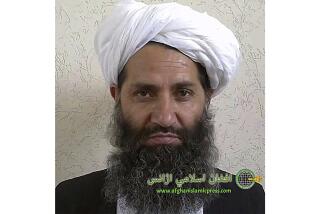Islamic State leader exhorts fellow Sunnis to join him
Reporting from Baghdad — The secretive head of the Islamic State militant group has made what appears to be his first public appearance, purportedly speaking from a mosque in the northern Iraqi city of Mosul, according to a video posted online Saturday.
The video, uploaded by supporters to websites, including YouTube, appears to show Abu Bakr Baghdadi, chief of the Islamic State, an Al Qaeda offshoot, leading prayers in the Grand Mosque in Mosul, which was overrun by insurgents last month as part of an offensive across northern Iraq. The Islamic State stands at the forefront of a Sunni Muslim uprising that threatens the U.S.-backed Iraqi government in Baghdad.
Baghdadi, a cleric previously known publicly only through grainy mug shots and audio messages exhorting fellow Sunnis to rise up and fight against “infidels,” appears as a plump, bearded figure outfitted in the group’s signature black clothing. He wears a black turban as he speaks in the mosque, famous for its leaning minaret.
In the video, Baghdadi ceremoniously climbs the stairs to the mosque’s pulpit and then begins to address worshipers in a resolute tone, focusing heavily on religious matters. The 21-minute clip was apparently filmed a day earlier, the first Friday of the holy month of Ramadan.
The group’s release of the video seems intended to burnish Baghdadi’s leadership and religious credentials as head of an Al Qaeda breakaway faction that has become infamous for its brutality, including public executions of perceived enemies and “apostates” and the crucifixion of some victims.
As he addressed the crowd, Baghdadi congratulated fighters for the group, previously known as the Islamic State of Iraq and Syria, for their territorial advances in broad swaths of both Iraq and neighboring Syria. The Islamic State is now running an Islamic caliphate established “after many years of jihad and patience and fighting the enemies of God,” Baghdadi said.
The speech was less a fiery sermon than a determined message dramatizing Baghdadi’s assertion that the Islamic State — which has attracted thousands of volunteers from the Middle East, Europe and elsewhere — sits at the vanguard of a global militant movement. He exhorted other Muslims to join what he called a righteous battle to restore Islam’s lost glory.
At one point, Baghdadi adopted a somewhat humble tone at odds with his position atop what many Western intelligence officials call the world’s best funded and most dangerous terrorist group, flush with cash, armaments and new recruits from the recent offensive.
“I have been plagued with this great matter, plagued with this responsibility,” Baghdadi lamented, “for I was placed as your caretaker, and I am no better than you.”
Baghdadi, believed to be in his early 40s, is a Baghdad-trained cleric from the city of Samarra, 60 miles north of the capital, who is reported to have fought against U.S. forces in Iraq. Baghdadi, whose real name is said to be Ibrahim Awwad Ibrahim Ali al Badri, was held by U.S. forces in Iraq as a “civilian internee” for 11 months before being released in December 2004, according to a U.S. defense official.
Baghdadi is said to be a disciple of the late Abu Musab Zarqawi, an Al Qaeda militant from Jordan. Zarqawi was killed by a U.S. airstrike in Iraq in 2006 after leading a campaign of suicide bombings, kidnappings and hostage beheadings against both Western forces and Shiite Muslims, the majority sect in Iraq. Al Qaeda-style Sunni militants generally view Shiites and those of related Muslim sects as infidels.
Aside from its brutality and military acumen, Baghdadi’s group has become known as a deft user of social media and the Internet to further its cause.
The video of Baghdadi’s sermon follows a string of media releases by the group, whose prowess in crafting its social networking presence is the subject of grudging admiration by its rivals. Aside from a cadre of passionate supporters on Twitter and other websites, the Islamic State regularly distributes high quality videos, photographs, and nasheed (religious songs) to push its agenda.
It has even ventured into English-language media, publishing the first issue of an online magazine called Dabiq, after the site of an epic battle between Christians and Muslims predicted in Islamic texts.
Featuring “The Return of Khilafah [Caliphate]” as its cover story, the 26-page web-zine carries stories heralding “a new era ... of might and dignity for the Muslims,” a common assertion among militant factions that hold that only a full embrace of Islam’s early ways will restore the lost glory of past centuries.
“Soon, by God’s permission, a day will come when the Muslim will walk everywhere as a master, having honor, being revered, with his head raised high and his dignity preserved” begins one article. “Anyone who dares to offend him will be disciplined, and any hand that reaches out to harm him will be cut off.”
The Islamic State has also emerged as the militant faction most interested in creating the actual trappings of a government. Islamic State supporters traded pictures of cars bearing license plates from “The Islamic State — Nineveh Prefecture,” after the Iraqi province that includes Mosul, with unconfirmed reports by a Turkish newspaper of an Islamic State official in Mosul preparing to issue 11,000 passports “in cities and border points under IS control.”
Bulos is a special correspondent.
More to Read
Sign up for Essential California
The most important California stories and recommendations in your inbox every morning.
You may occasionally receive promotional content from the Los Angeles Times.











